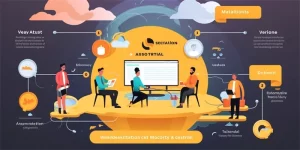Introduction

YouTube has become a widespread platform for musicians to share their music videos with a global audience. With billions of users and countless hours of video content being uploaded, it raises the question of how music videos on YouTube generate revenue. In this article, we will explore the various ways in which music videos make money on YouTube.
1. Advertising Revenue
Music videos on YouTube generate a significant portion of their earnings through advertisements. YouTube’s partnership program allows content creators to monetize their videos by displaying ads before, during, or after the video. The revenue generated is based on factors such as the number of views, duration of ads watched, and viewer engagement.
These advertisements can be in the form of skippable ads, non-skippable ads, banner ads, or even sponsored content. Advertisers pay YouTube for ad placements, and a portion of this revenue is shared with content creators.
2. YouTube Premium
YouTube Premium, a subscription-based service, also contributes to the revenue generation of music videos on YouTube. When a user with a YouTube Premium subscription views a music video, the artist receives a portion of the subscription fee. This allows creators to benefit from users who choose to skip advertisements by paying for a premium experience.
Furthermore, YouTube Premium users have access to exclusive content, which may incentivize them to choose premium subscriptions over free ad-supported content.
3. Merchandise and Concert Sales
With the global reach of YouTube, music videos act as a powerful promotional tool for artists. Viewers who enjoy a music video may be more inclined to explore the artist’s merchandise or attend their concerts. Artists often promote their merchandise and upcoming shows within the video description or through annotations, driving additional revenue streams.
The popularity of a music video on YouTube can significantly boost merchandise sales and increase ticket sales for concerts, helping artists generate substantial earnings.
4. Sponsorships and Brand Deals
Successful music videos attract the attention of brands and sponsors who may be interested in collaborating with the artist. These collaborations can result in brand deals, where the artist promotes a product or service within their music video. In return, the artist receives financial compensation or other benefits.
By partnering with brands, music videos not only generate additional revenue for the artist but also offer a mutually beneficial platform to reach a targeted audience.
5. Content ID
YouTube’s Content ID system enables artists and copyright holders to track and monetize their music videos on the platform. Through this system, artists can identify any unauthorized use of their music in other videos and choose to monetize those videos by placing ads or blocking them altogether.
Content ID provides a means for music videos to monetize not only through their original uploads but also by identifying and controlling derivative content.
6. YouTube Red/YouTube Music
With the introduction of YouTube Red and YouTube Music, music videos have gained another avenue for revenue generation. YouTube Red allows users to watch ad-free content, and the revenue generated from subscriptions is shared with content creators, including music video artists.
YouTube Music, on the other hand, focuses specifically on music-related content, providing another platform for artists to monetize their music videos and reach a targeted audience.
7. Fan Funding and Donations
Many artists on YouTube rely on the support of their dedicated fan base. Fans often contribute through crowdfunding platforms like Patreon or by making donations through platforms like PayPal or Venmo.
By providing options for fans to financially support their favorite artists, music videos on YouTube can generate income directly from their fan base.
8. Sync Licensing
Artists who upload their music videos to YouTube may also earn money through sync licensing. This involves granting permission for music videos to be used in other media, such as films, television shows, or commercials. The artist receives royalties in return for the usage of their music.
YouTube acts as a platform for artists to showcase their music videos and potentially attract sync licensing opportunities, creating an additional revenue stream.
9. Collaborations and Cross-Promotion
YouTube is a social platform where artists can collaborate with each other, creating music videos featuring multiple artists. These collaborations not only allow for creative expression but also open up opportunities for cross-promotion.
By reaching out to a wider audience through collaborations, artists can increase their exposure and potential revenue-generating opportunities.
10. YouTube Livestreaming
Artists can utilize YouTube’s livestreaming feature to connect directly with their audience and generate revenue through live performances, Q&A sessions, or exclusive behind-the-scenes content.
Livestreaming provides a unique opportunity for artists to engage with their fans in real-time and receive direct financial support through donations or super chat features.
Conclusion
Music videos on YouTube have multiple avenues for revenue generation, ranging from advertising revenue and YouTube Premium subscriptions to merchandise sales, brand deals, and sync licensing opportunities. Artists can leverage these various monetization strategies to not only generate revenue but also widen their audience reach and enhance their overall success.
References:
1. Smith, C. (2018). How do YouTubers Make Money from Music Videos?
2. Rose, E. (2020). How Do Musicians Make Money on YouTube? Understanding YouTube Revenue Streams.
Author: [Your Name]
Bio: [Your Bio]
Caption: Original image created by [Your Name] for this article.








